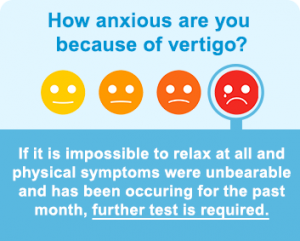A clear description of symptoms will help doctors make a diagnosis.
What information about vertigo should I tell my doctor?
How long does the vertigo attack lasts?
Seconds to minutes
Minutes to hours
Days to weeks
Months to years
Describe your vertigo attack.
Is it spinning?
Do you feel you are losing balance?
Can you identify what triggers the attack if any?
Just sitting and you get an attack of vertigo
Did coughing, lifting heavy weights or changes in position trigger the attack?
Do you feel dizzy while sitting or lying down?
Do you feel dizzy after getting up?
Besides vertigo what other symptoms do you experience?

Do you have ringing of the ears?
Do you also suffer from headache?
Are you extra sensitive to light or sound?
Are you experiencing double vision?
Do you feel weakness in some parts of the body?
How has vertigo affected your feelings? Because of vertigo… (Answer Yes or No)
I feel frustrated.
I am afraid to leave home without having someone accompany me.
I have been embarrassed in front of others.
I am afraid people may think I’m intoxicated.
I find it difficult to concentrate.
I am afraid to stay home alone.
I feel handicapped.
It has placed stress on my relationship with my family and friends.
I am depressed.
(Jacobson GP, Newman C. The Development of Dizziness Handicap Inventory. Arch Otolaryngol Head Neck Surg. 1990; 116:424-427)
You are not alone in this journey. Talk to a friend, loved one and your doctor.

Have you felt low because of vertigo?
During the past month, have you often been bothered by feeling down, depressed, or hopeless?
During the past month, have you often been bothered by little interest or pleasure in doing things?
“Yes” to one (or both) questions = positive test (requires further evalutation)
“No” to both questions = negative test (not depressed)
How has vertigo affected your movement? Because of vertigo… (Answer with a Yes or No)
Looking up makes me dizzy.
Walking down the aisle of a supermarket makes me dizzy.
Performing sports, dancing, household chores make me dizzy
Quick movements of head make me dizzy.
Walking down a sidewalk makes me dizzy.
Bending over makes me dizzy.
(Jacobson GP, Newman C. The Development of Dizziness Handicap Inventory. Arch Otolaryngol Head Neck Surg. 1990;116:424-427)
You are not alone in this journey. Talk to a friend, loved one and your doctor.
How has vertigo affected the things you usually do? Because of vertigo…
(Answer with a Yes or No)
Dizziness has restricted my travel either for business or recreation.
I have difficulty getting into or out of bed.
I don’t usually go out anymore because of vertigo: dinner, movies, or parties.
I have difficulty reading.
I don’t do strenuous housework anymore.
It’s difficult for me to walk outside alone.
It’s more difficult to walk in the dark unlike before.
Vertigo has affected my job and my responsibilities at home.
(Jacobson GP, Newman C. The Development of Dizziness Handicap Inventory. Arch Otolaryngol Head Neck Surg. 1990;116:424-427)

You are not alone in this journey. Talk to a friend, loved one and your doctor.